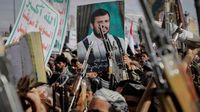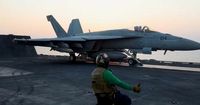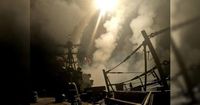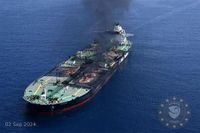In a dramatic escalation of military action within the volatile Yemeni conflict, the United States has intensified strikes against the Iran-aligned Houthi rebels. Following a series of provocative attacks by the Houthis on shipping lanes in the Red Sea, U.S. President Donald Trump has vowed to use overwhelming force to obliterate the group.
The renewed conflict began to spiral on March 15, 2025, when the U.S. launched significant airstrikes aimed at Houthi positions in Yemen, particularly in the capital city of Sanaa and surrounding areas. Reports from Houthi-run Al Masirah TV indicated that these strikes resulted in considerable casualties, with the Huthi-run health ministry reporting 53 deaths and nearly 100 injuries by March 19.
The intensifying operations came as the Houthis claimed responsibility for a series of attacks targeting American naval vessels in the Red Sea, which they justified as a show of support for Palestinians amid the ongoing war in Gaza. Houthi officials assert that their actions are aimed at disrupting Israeli and U.S. military operations while providing solidarity to those affected by the Gaza conflict.
On March 19, Trump issued a grave warning on his Truth Social platform, declaring that the Houthis would face complete annihilation. He stressed that Iran must immediately cease its support for the group. “Tremendous damage has been inflicted upon the Houthi barbarians,” he stated, adding that the situation would deteriorate further for them.
The U.S. military campaign against the Houthis is drawing parallels to previous operations under the Biden administration, which also targeted Houthi strongholds but struggled to mitigate the group’s aggressive tactics. Trump's approach, however, seeks a far more aggressive strategy towards the rebelling faction, signaling a stark shift in military posture since he returned to office.
In the midst of this conflict, the Houthis have reaffirmed their commitment to continue their offensive. Jamal Amer, the Houthi foreign minister, articulated their resolve, stating, “Now we see that Yemen is at war with the U.S. and that means that we have a right to defend ourselves with all possible means, so escalation is likely.” This assertion illustrates the group's determination to challenge U.S. military efforts directly and marks an explicit confrontation against American armed forces.
The Houthis' strategic operations have seen them launch over 100 attacks on commercial vessels since the Israeli-Palestinian conflict reignited late last year, fueling concerns about security in critical shipping lanes vital for international trade. This has put extra pressure on the U.S. military to deploy resources to intercept Houthi missiles and drones aiming for both commercial and military targets.
The conflict has broader implications, as Iran remains a significant backer of the Houthi forces, described by many analysts as part of a wider “Axis of Resistance” opposing U.S. and Israeli interests in the region. Trump has underscored this connection, linking every shot fired by the Houthis to Iranian leadership and arms supplies. He warned of severe repercussions for Iran if it continues to support the Houthis in this aggressive campaign.
Reports indicate that the Houthis have fortified their military capabilities in response to the U.S. airstrikes, relocating their assets and utilizing underground extensions to avoid detection by U.S. intelligence. Recent U.S. operations have targeted these newly established military positions, suggesting an adaptive approach by Houthi forces to defend against increasing external assaults.
The Houthis have issued threats to escalate their military operations against Israel unless the latter ends its offensive against Gaza and lifts its blockade on humanitarian aid in the area. “The Yemeni Armed Forces affirm that the U.S. aggression will not deter the steadfast and struggling Yemen from fulfilling its religious, moral, and humanitarian duties toward the Palestinian people,” the group stated, conveying their intent to respond robustly to any continued military pressure.
The complexity of this situation is underlined by recent high-level discussions where Iranian officials reportedly communicated a message to the Houthi envoy in Tehran urging a de-escalation of tensions. However, amid these diplomatic overtures, the immediate reality remains a swift increase in military engagements across the region, highlighting the precarious balance of power in the Middle East.
As the situation evolves, analysts emphasize the need for a broader approach to address the underlying conditions driving the Yemen conflict, advocating for diplomatic engagement alongside military operations to navigate through these tumultuous waters.
In conclusion, the future trajectory of U.S.-Houthi relations hinges on a myriad of factors, including Iran's role, the outcomes of ongoing military confrontations, and whether diplomatic efforts can successfully bridge the chasm of conflict that has long enveloped Yemen.





